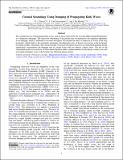Coronal seismology using damping of propagating kink waves
Abstract
We consider the use of propagating kink waves, such as those observed by the Coronal Multi-channel Polarimeter, as a diagnostic technique. The transverse structuring of the plasma may be inferred by the frequency-dependent wave damping, which is attributed to resonant absorption. We include the effect of reflection of waves at the loop footpoints, which leads to the asymmetry parameter, describing the ratio of driven wave power at the footpoints becoming weakly constrained. The classical model of resonant absorption based on an exponential damping profile significantly overestimates the damping rate in coronal loops with low density contrast ratios. The use of the exponential profile in an analysis of observations therefore leads to underestimates for the density contrast ratio and associated parameters such as the heating rate following phase mixing.
Citation
Pascoe , D J , Van Doorsselaere , T & De Moortel , I 2022 , ' Coronal seismology using damping of propagating kink waves ' , Astrophysical Journal , vol. 929 , no. 1 , 101 . https://doi.org/10.3847/1538-4357/ac5e30
Publication
Astrophysical Journal
Status
Peer reviewed
ISSN
0004-637XType
Journal article
Description
Funding: D.J.P. and T.V.D. were supported by the European Research Council (ERC) under the European Union's Horizon 2020 research and innovation program (grant agreement No. 724326) and the C1 grant TRACEspace of Internal Funds KU Leuven. The research leading to these results has received funding from the UK Science and Technology Facilities Council (consolidated grant ST/N000609/1), the European Union Horizon 2020 research and innovation program (grant agreement No. 647214). I.D.M. received funding from the Research Council of Norway through its Centres of Excellence scheme, project number 262622.Collections
Items in the St Andrews Research Repository are protected by copyright, with all rights reserved, unless otherwise indicated.

